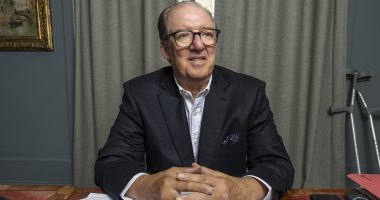Share this @internewscast.com
For all the personal accolades he earned, 2023-24 was yet another bleak season for Harry Kane.
The England captain’s decade-long search for silverware continued for both club and country as Bayern Munich had their first trophyless season since 2011-12 and England were beaten 2-1 in the final of Euro 2024 by Spain.
The £86million striker tallied a remarkable 44 goals in all competitions in his first season at Bayern but failed to win a trophy, the main reason he moved to Germany. And although Kane shared the golden boot at Euro 2024, his Three Lions team were made to wait two more years for another shot at international silverware.
Could 2024-25 finally be his season or will he have to wait until the 2026 World Cup to end the hunt for his first trophy since he won the Torneio Internacional Algarve with England Under 17s?

With defeat in the Euro 2024 final, Kane has now lost all six of the cup finals he has played in

Despite scoring 44 goals last season, Bayern had their first trophyless season since 2011-12

Will 2024-25 be the year that trophy-cursed Harry Kane finally gets his first winner’s medal?
Kane’s first season in Bavaria started poorly and didn’t much improve, despite his personal goal tally of 44.
Bayern finished third behind Xabi Alonso’s masterful Bayer Leverkusen and Stuttgart, a remarkable fall from grace for the German giants whose combined player salaries are almost five times more than Leverkusen’s.
Kane’s Bundesliga Golden Boot winning haul of 36 goals could do little to halt the march of Alonso’s side to the league title.
In the German Super Cup at the start of last season, Kane’s first shot at silverware in his new colours, Bayern lost 3-0 to a Dani Olmo-inspired RB Leipzig.
That was Kane’s fifth career cup final defeat having previously lost the 2015 and 2021 League Cup finals, the 2019 Champions League final and the Euro 2020 final in a heartbreaking penalty shootout. After England’s 2-1 defeat in the Euro 2024 final, Kane has now lost six.
In 2016, Tottenham were also favourites to become Premier League champions only for surprise package Leicester City to beat them to the title as they somehow finished third in a two-horse race with Arsenal second.
Thomas Tuchel’s former Bayern side continued on a similarly flat note in the German Cup, last season. In November they inexplicably lost 2-1 to third division side FC Saarbrucken after conceding a 96th-minute winner.
Bayern did push eventual winners Real Madrid incredibly close in a 4-3 aggregate defeat in the Champions League semi-final, with Kane finishing as joint top scorer with Kylian Mbappe on eight goals – but it was a bleak season for Bayern.
It ended as it started, in defeat, with a 4-2 loss to Hoffenheim.

Harry Kane’s first cup final loss was a 2-0 defeat by rivals Chelsea in the 2015 League Cup final

Bayern and Kane were on the receiving end of an embarrassing giant killing in the German Cup (DFB Pokal) as they lost 2-1 to third division side FC Saarbrucken after conceding in injury time
Bayern and Kane will have another shot at the German Cup and Bundesliga next season and have also qualified for the Champions League again.
Successive trophyless seasons at the Allianz Arena would be disastrous not only for Kane but also for new manager Vincent Kompany.
Kompany was perhaps a surprise choice for the Bayern job. His Burnley side played some high-octane football in the Championship in 2022-23 as they won the league with 101 points, losing just three games.
But the step up to the Premier League was a shock to the system for Kompany and his team as they immediately yo-yoed back down to the Championship after finishing 19th.
While their budget was considerably lower than many of their top flight competitors, it may worry Kane that Kompany’s Burnley scored just 41 league goals last season. Kompany’s inexperience at the highest level could well hurt Kane’s chances of securing that precious first trophy.
Kane and Kompany’s work will also be cut out for them with Xabi Alonso remaining at Bayer Leverkusen.
Alonso was linked with the Bayern and Liverpool vacancies but declined both to try and challenge in the Champions League and defend the Bundesliga title with Leverkusen.
Alonso’s players have predictability and a proven winner in their coach. Kane and Co, not so much. So it won’t just be Kane who is out to prove something next season, Kompany must step up too.

New Bayern boss Vincent Kompany stormed to the Championship title with Burnley in 2022-23 but results soured in the Premier League last season as they were relegated after coming 19th

Bayer Leverkusen’s Xabi Alonso rejected both Bayern Munich and Liverpool to stay on at Leverkusen – will Kane and Co. be able to defeat the Spaniard in the Bundesliga next season?
With three more shots at silverware next year, and at least three the year after that, Kane really ought to pick up a title in Munich.
But if he can’t manage it then there is always the matter of the 2026 World Cup.
The England captain’s previous three tournaments for the Three Lions haven’t gone quite to plan.
In hindsight, Euro 2020 might well have been Kane’s best ever chance to win a trophy. On home soil with a rapturous and expectant post-lockdown crowd, it seemed like storybook stuff. But it wasn’t to be as England fluffed their lines in the final, losing on penalties to Italy.
Kane was the one doing the fluffing in Qatar at the 2022 World Cup and it will be a long time before memories of his hideously ballooned penalty in the quarter-final against France fade.
His Euro 2024 showing also left much to be desired, albeit he appeared to be playing through injury.
Kane was criticised by many fans and pundits alike for his lack of movement and pressing.

Might Euro 2020 have been the best chance Kane will ever get to win silverware in his career?

Kane’s ballooned penalty against France in 2022 will be a hard one for England fans to forget
England legend and Match of the Day host Gary Lineker was just one to comment on Kane’s performances.
‘Harry Kane needs to do a lot better. His movement was minimal, he didn’t look to go in behind but even when he did look to come in short, he’s just drifted short very lethargically, plodding short. And that’s not going to help.
‘When you’re a striker you have two jobs, one is scoring goals which he is brilliant at. But I think he needs his manager to say “I need more from you Harry”,’ Lineker said after England’s 1-1 draw with Denmark in the group stage.
Ollie Watkins replaced a visibly labouring Kane in the final after 61 minutes and his heroic performance in the semi-final was memorable for the right reasons.
With the next World Cup held in North America in just two years, when Kane will be almost 33 years old, might whoever the next England manager is look for a fresher-faced option to take the No9 shirt?
Kane will certainly hope not and given his goalscoring track-record in the white shirt, it would be a brave person to bet against him lining up again as England captain and leading the line in 2026.
Whether England can overcome their international silverware hoodoo on foreign soil, though, is a question for another day.

With players like Ollie Watkins producing heroics at Euro 2024, there will be several English strikers snapping at Kane’s heals to take his spot in the No9 shirt come the 2026 World Cup

Bayern fans expect trophies and if Kane doesn’t deliver next season his time could well run out
While he has more than enough individual accolades for five careers let alone one, it is trophies Kane sorely lacks.
Whether he wins a title at Bayern or for England cannot yet be known, but at a club with as busy a trophy cabinet as the Bavarians you would really expect him to get his first taste of glory.
Bayern fans have come to expect, much less hope, for silverware domestically. The return of the Meisterschale, the Bundesliga trophy, to Munich would be a start. But for Kane the ultimate prize will be a winner’s medal in the Champions League or for England.
For those he may have to wait a little while longer as Kompany develops his system at Bayern.
One thing that is clear, though, time is running out for the 30-year-old Kane.












